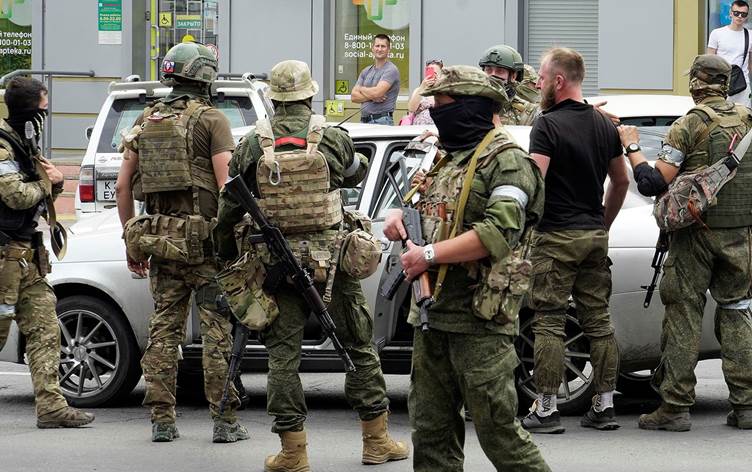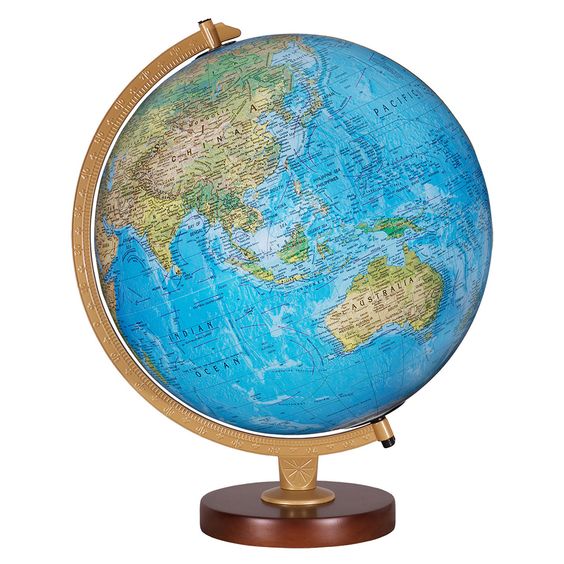
A few weeks ago the Wagner Group were the heroes of the motherland who had captured Bakhmut. On Saturday they were traitors who had “stabbed Russia in the back” and a few hours later they were pardoned.
By Tom Arms
The Kremlin skies are turning black with the wings of chickens coming home to roost.
The Russian mutiny may have caught Putin and the rest of the world off guard, but its roots were there for all to see.
It is the direct result of hubris, decades of corruption, lies, autocracy and an over-reliance on uncontrolled non-state players.
Wagner head Yevgeny Prigozhin may have been exiled to Belarus but the problems raised by his largely unopposed march on Moscow are still there.
They start with the structure of the Russian military and government. Vladimir Putin has created a feudal edifice with a complex chain of command that rivals that of any medieval monarch.
If any of his nobles (aka oligarchs) looked as if they were accumulating too much power then he simply dismissed, exiled or murdered. Those who remained loyal were transformed from crooks and spies into billionaires.
This feudal structure extended to the military. The Wagner Group is not the only Russian private army. There are ten of them, including one which owes its loyalty to Army Chief of Staff Valery Gerasimov and a praetorian guard for President Putin.
The divided army is the main reason that Prigozhin could successfully occupy the major Russian military depot at Rostov-on-Don and march to within 120 miles of Moscow. There are unconfirmed reports that he had the support of General Sergei Surovikin, commander of Russian forces at Rostov and in southern Ukraine and General Mikhail Mizintsev, better known as the “butcher of Mariupol.”
There are reports that the FSB (successor to the Soviet Union’s KGB) is conducting a full scale purge of the army
Surovikin is reported to be under arrest. The whereabouts of Mizintsev is unknown. Both men were praised by Prigozhin in his numerous social media rants along with Alexei Dyumin who must also now be under a cloud.
But the problems extend beyond the top brass. War creates opportunities for military promotion. It is estimated that 80 percent of the colonels and 70 percent of the majors have been created since February 2022, most of them by Surovikin and Mizintsev. As I am going to press, there are reports that the FSB (successor to the Soviet Union’s KGB) is conducting a full scale purge of the army.
Military loyalty is not Putin’s only problem. The loyalty of the government and oligarchical elite has also been called into question by the mutiny. On the Friday and Saturday of the Wagner uprising, airline and railway offices were inundated for tickets out of Moscow, a fact which was confirmed by none other than the Speaker of the Russian Duma (parliament), Vyacheslav Volodin.
On top of that, some of the oligarchs quickly boarded their private planes and flew either to St Petersburg or out of the country. These included construction billionaire Arkady Rotenberg and Vladimir Potatnin, said to be the wealthiest man in Russia. Also leaving the country was Denis Manturov, the Industry Minister. He flew to Turkey.
There are reports that on Monday, orders were issued to all government offices that they had to swear an oath of loyalty the Putin regime.
Perhaps most damaging to the Putin regime was the Russian public perception of their president and the war in Ukraine. Vladimir Putin had until last week managed to project himself as the man in complete control of events.
Then came the mutiny. A few weeks ago the Wagner Group were the heroes of the motherland who had captured Bakhmut. On Saturday they were traitors who had “stabbed Russia in the back” and a few hours later they were pardoned. The dizzying about turns exposed Putin as a weak liar.
Then there is the conduct of the war itself. Prigozhin has been instrumental in revealing the truth about the fighting. In a series of social media video rants in the weeks before his mutiny, the Wagner leader declared that the Ukraine War was not being fought against NATO. Furthermore it was not a “special military operation” but a full-scale invasion launched by a corrupt military elite for their own financial gain.
Who should the Russian believe, the much-praised military leader or the main who raised him to his exalted position?
That cracks are appearing in the Russian propaganda machine were quickly apparent. Most of the state-controlled media pointed to the quick end of the mutiny as proof that Putin retained an iron grip on the military. But not all of the normally sheep-like press agreed.
The tabloid Moskovsky Komsomolets queried the causes and effects with the headline: “Prigozhin Leaves, Problems Remain. Deep Political Problems Remain.” Its leading and well-informed columnist, Mikhail Rostovsky, went on to write: “The mutiny showed the world that Russia is vulnerable.”
 World Review
World Review
World Reaction to Wagner Group Mutiny
World Reaction to the Wagner Group Mutiny ranged from the supportive to the thoughtful to the frightened and everything in between.
A Russian exile in Turkey told America’s National Public Radio: “The Putin regime is a circus because they don’t have power. They can’t even control their pets.”
Ukrainian President Volodomyr Zelensky was understandably jubilant. “Anyone who choose the path of evil,” he said, “destroys himself… Russia’s weakness is obvious…And the longer Russia keeps its troops and mercenaries in our land, the more chaos, pain and problems it will have for itself later.”
The immediate comment from Washington was “No Comment” and Secretary of State Antony Blinken ordered US diplomats to stick rigidly to that line. He was concerned that any American remarks would lead to Russian claims of US involvement. It took four days before President Biden specifically denied US backing and said “This was part of a struggle within the Russian system.”
India has been a key supporter of Russia during the Ukraine War. It has lobbied on behalf of Moscow among developing countries and its purchases of Russian oil and gas helps finance Putin’s war machine. India has long-standing close relations with Moscow which supplies the country with half of their weapons. But that weapons supply has been disrupted by the Ukraine War and Prime Minister Narendra Modi just completed a successful state visit to America. The comment from New Delhi was a non-committal: “India prefers a strong, stable and influential Russia.”
The European Council met on Thursday to discuss the implications of the mutiny. The 27 members are worried. Russia has the world’s largest nuclear arsenal and they are concerned about the sanity of the person who has their finger on the nuclear button, or that Putin feels backed into a corner. “Russia,” said European Commission President Ursula von der Leyen, “has become unstable and more dangerous.” Joseph Borrell, Commissioner for Foreign Affairs, said: “A weaker Putin is a greater danger.”
The Chinese reaction to the Wagner Mutiny was guarded. Party mouthpiece “The Global Times” was quick to point out that the insurrection was short-lived and relatively bloodless. But at the same time, Beijing diplomats were saying that it was important that their “limitless” partner put his house in order. They are also adamant that they were not wrong to “bet” on the Putin horse.
Xi Jinping is as worried about the domestic repercussions of Putin’s problems as the diplomatic. China’s party-dominated governmental structure is different from Russia’s feudal system. But they are allied autocracies and both the domestic Chinese and world public opinion are quick to draw comparisons. Chinese social media has been awash with veiled and unveiled criticisms of the Chinese Communist Party in the wake of the failed Russian mutiny. Some bloggers have even used the banned words “Tiananmen Square.”
Wagner Group’s Activities
The Wagner Group’s activities are not confined to Ukraine. They started there in 2014 with the “Little Green Men” in the Donbas Region. But then they moved into Syria, Libya and 10 countries in Africa.
In Mali they have taken over from the French as the foreign force fighting Jihadists. This week the Mali government decided to rely entirely on the Russian mercenaries and booted out the UN peacekeeping forces in the country.
In total, there are 5,000 Wagner troops in Africa. They usually act as advisers in Sudan, Libya Mali and the Central African Republic. They are valued because as mercenaries they are not restricted by the normal rules of international behavior. So they either teach or participate in kidnappings, robberies, assassinations, and torture and cyber warfare.
Not all of the Wagner Group’s activities are military. They also advise African leaders on how to intimidate the media and rig elections. They also have big stakes in illegal gold, diamond and manganese mining operations, the profits from which have turned Yevgeny Prigozhin into a billionaire.
The big question now is what will happen to the far-flung Wagner Empire in the wake of Prigozhin’s fall from grace. The catalyst for the mutiny was the refusal of the Wagner troops to place themselves under the command of the state military leaders.
The demand was made mainly because Prigozhin’s was challenging the authority of Defense Minister Valery Gerasimov and, by implication, Putin himself. Up until that point the Wagner Group had proved useful as an arms-length organization which allowed Putin deniability when they crossed the lines of acceptable behavior.
The Russians cannot just close down the group’s operations in Africa and the Middle East. They have become too important as an extension of Russian power. But if the government takes them over, they will have to change the group’s behavior or run the risk of the “rogue state” brand. It is more likely that Putin will simply appoint another oligarch to head it. He may even allow Prigozhin to continue to run it from his Belarus exile. In the meantime, the Wagner offices remain open recruiting.
Private Russian Armies
One of the most frightening private Russian armies in the wake of the failed mutiny is the one operated by Chechen warlord Ramzan Kadyrov.
Before the Wagner mutiny there were ten private armies in Russia. Whether or not the Wagner Group remains in the category is up in the air.
But Kadyrov’s force of several thousand Chechens (known as the Kadyrovites) remains firmly under his command and dedicated to enforcing his rule in Chechnya through assassination, torture, forced disappearances, and kidnappings inside and outside Chechnya. He maintains a stranglehold on the media and is believed to be responsible for the Moscow murder of campaigning journalist Anna Politkovskaya.
Ramzan Kadyrov is the son of the Chechnya’s Muslim leader Akhmad Kadyrov who led the Islamic rebellion against Moscow in the first Chechen War in 1994. But in the second war, Akhmad and his son switched sides and pledged allegiance to Vladimir Putin and Russia. Akhmad was rewarded with the Chechen presidency, but the move alienated the family from large segments of Chechnya’s Islamic community and in 2004 Akhmad Kadyrov was assassinated.
Ramzan was appointed First Deputy Prime Minister and in 2007 became Prime Minister when he turned 30, the minimum age allowed to take the post. Almost immediately he launched campaigns against women’s rights and ordered extra-judicial killings of gay men. He became fiercely loyal to Putin and called for the invasion and annexation of Georgia and Ukraine. In 2014 he offered to send troops to Syria.
Kadyrov also offered troops for Eastern Ukraine and Crimea and may have participated in the attack on Kyiv in February-March 2022. He has called for a full-scale mobilisation to fight Ukraine; an attack on Poland, and the use of nuclear weapons. When news of Prigozhin’s mutiny broke, Kadyrov (who has the rank of Colonel General in the Russian Army) offered to march on Rostov-on-Don to quell the uprising. Putin thanked and ignored him.
During Kadyrov’s 16-year-rule he has placed his family in key positions and amassed a fortune of $100 million. This is relatively small by Russian oligarchical standards, but enough to buy him a rare Lamborghini and a priceless collection of Chechen daggers.
There have been recent suggestions that Kadyrov is too extreme even for Putin. Earlier this year one of Kadyrov’s close Chechen allies, General Apti Alaudinov, was killed by a poison-laced letter. Some observers believe that the assassination was a Kremlin warning to Kadyrov to moderate his actions and public statements.
Paris is rioting
More than 700 people had been arrested by Friday. Cars have been overturned and torched, street barricades erected and bricks are thrown at police. The Louis Vuitton shop in the Champs Elysees has been destroyed along with McDonalds and the Paris Nike outlet. An estimated 200 police and similar number of rioters have been injured and treated in hospitals.
The riots have spread beyond Paris and President Emmanuel Macron has held back to back emergency meetings. He has called on parents to keep their children off the streets and said there is no justification for the violence.
The rioters disagree. The spark for the current frenzy was the police shooting of ethnic Arab teenager Nahel M. He was stopped by police at a traffic light after being spotted driving a Mercedes with Polish license plates. The suggestion was that the boy had stolen the car and was attempting to flee. That does not, of course, justify shooting him.
President Macron was quick to attack the killing. The policeman concerned has been charged with voluntary manslaughter and has publicly apologized. But the riots continue because the roots are much deeper than one death.
There have been 13 police killings in the past year. Almost all of them have involved people of Arab or Black African descent. The latest was in the working class Paris suburb of Nanterre where racial tensions have been simmering since the death in police custody of Adama Traore which in turn was preceded by the deaths of Zyed Benna and Bouna Traore.
But the demands of the rioters have quickly escalated beyond allegations of police brutality into claims of general persecution. As well as “Justice for Nahel,” the rioters are demanding better housing, schools and job opportunities for the growing ethnic community.
The Macron government has introduced some reforms to create greater opportunities. But the ethnic communities complain that it is too little too late. Conversely White working class France say it is too much too soon and that Macron is handing over their country to immigrants. The current riots will only further divide the country and be grist to the political mill of right-wing populist leader Marine Le Pen. A recent poll showed that if presidential elections were held now, she would win.
_____________
 Tom Arms is foreign editor of Liberal Democrat Voice. He is working on an update of his “Encyclopedia of the Cold War” and co-hosts the podcast “TransAtlantic Riff” which could be heard by clicking here https://open.spotify.com/show/3ntjretAKNLZNFpA5ZEGDG
Tom Arms is foreign editor of Liberal Democrat Voice. He is working on an update of his “Encyclopedia of the Cold War” and co-hosts the podcast “TransAtlantic Riff” which could be heard by clicking here https://open.spotify.com/show/3ntjretAKNLZNFpA5ZEGDG
[This analytical article is based on author’s personal views and doesn’t reflect the editorial policy of Sindh Courier]